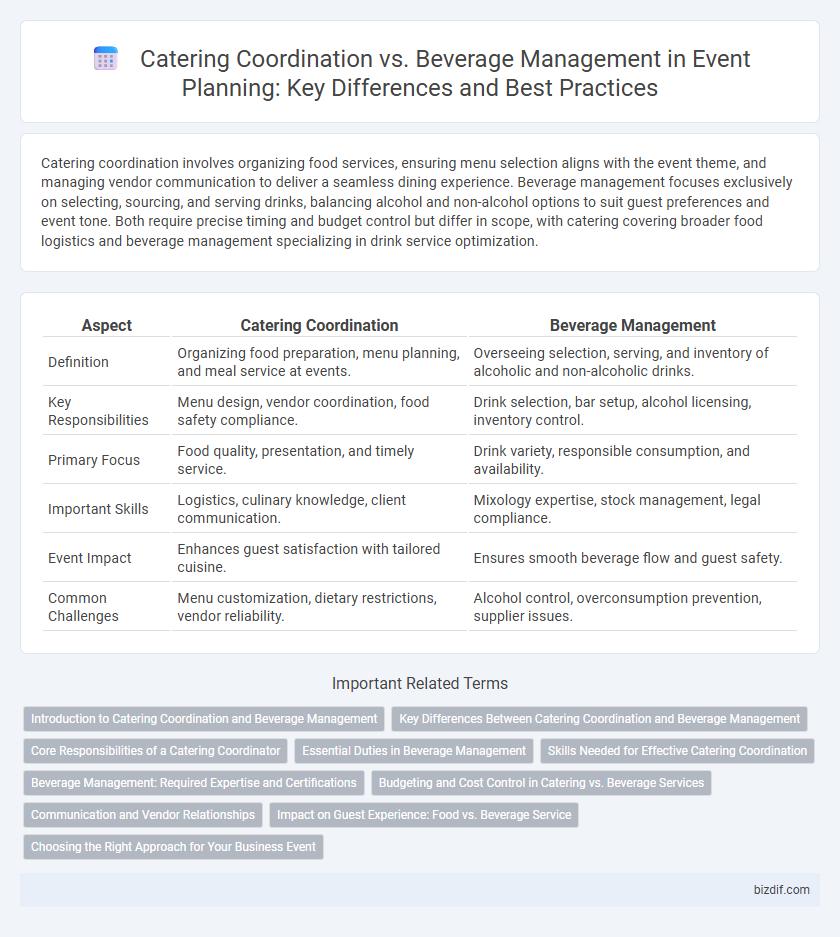Catering coordination involves organizing food services, ensuring menu selection aligns with the event theme, and managing vendor communication to deliver a seamless dining experience. Beverage management focuses exclusively on selecting, sourcing, and serving drinks, balancing alcohol and non-alcohol options to suit guest preferences and event tone. Both require precise timing and budget control but differ in scope, with catering covering broader food logistics and beverage management specializing in drink service optimization.
Table of Comparison
| Aspect | Catering Coordination | Beverage Management |
|---|---|---|
| Definition | Organizing food preparation, menu planning, and meal service at events. | Overseeing selection, serving, and inventory of alcoholic and non-alcoholic drinks. |
| Key Responsibilities | Menu design, vendor coordination, food safety compliance. | Drink selection, bar setup, alcohol licensing, inventory control. |
| Primary Focus | Food quality, presentation, and timely service. | Drink variety, responsible consumption, and availability. |
| Important Skills | Logistics, culinary knowledge, client communication. | Mixology expertise, stock management, legal compliance. |
| Event Impact | Enhances guest satisfaction with tailored cuisine. | Ensures smooth beverage flow and guest safety. |
| Common Challenges | Menu customization, dietary restrictions, vendor reliability. | Alcohol control, overconsumption prevention, supplier issues. |
Introduction to Catering Coordination and Beverage Management
Catering coordination involves organizing menus, managing food preparation schedules, and liaising with chefs to ensure timely service during events. Beverage management focuses on selecting appropriate drinks, regulating bar inventory, and overseeing bartenders to maintain quality and compliance. Both roles require strategic planning and seamless communication to enhance the overall guest experience.
Key Differences Between Catering Coordination and Beverage Management
Catering coordination involves organizing food services, menu planning, and ensuring meal delivery aligns with event timing, while beverage management focuses on sourcing, stocking, and serving drinks, including alcohol control and mixology. Catering coordinators handle vendor relationships and dietary accommodations, whereas beverage managers oversee bartenders, compliance with licensing laws, and beverage inventory control. Both roles are critical for event success but differ primarily in their scope of responsibility and specialized expertise.
Core Responsibilities of a Catering Coordinator
A Catering Coordinator's core responsibilities include managing menu selections, coordinating food preparation timelines, and liaising with caterers to ensure seamless delivery and presentation. They oversee dietary restrictions, organize staff assignments for serving, and monitor quality control to meet event standards. Beverage management, while critical, typically falls under a separate role focused on inventory control, drink menu curation, and compliance with alcohol regulations.
Essential Duties in Beverage Management
Beverage management in event planning involves overseeing alcohol inventory, ensuring compliance with local liquor laws, and training staff on responsible service practices. Essential duties include coordinating with suppliers to secure quality drinks, managing the bar setup and flow during the event, and monitoring consumption to prevent over-service. Effective beverage management enhances guest experience while maintaining safety and legal adherence.
Skills Needed for Effective Catering Coordination
Effective catering coordination requires skills in menu planning, vendor negotiation, and dietary restriction management to ensure seamless service. Expertise in scheduling, team leadership, and inventory control supports timely food preparation and delivery. Strong communication and attention to detail optimize client satisfaction and event flow.
Beverage Management: Required Expertise and Certifications
Beverage management in event planning demands expertise in mixology, inventory control, and alcohol safety regulations to ensure seamless service and compliance. Professionals often hold certifications such as TIPS (Training for Intervention Procedures) or ServSafe Alcohol to manage responsible alcohol distribution and prevent over-consumption. Mastery of these skills supports successful event execution by enhancing guest experience and minimizing legal risks.
Budgeting and Cost Control in Catering vs. Beverage Services
Budgeting and cost control in catering coordination involve managing food quantities, menu selections, and vendor negotiations to optimize expenses while maintaining quality. Beverage management focuses on tracking alcohol and non-alcoholic beverage inventory, pricing strategies, and minimizing waste to ensure profitability. Effective financial oversight in both areas requires detailed forecasting and real-time expense monitoring to align with overall event budgets.
Communication and Vendor Relationships
Effective catering coordination hinges on clear communication with food vendors to ensure timely delivery and menu accuracy, while beverage management requires precise dialogue with suppliers to balance inventory and comply with licensing regulations. Both roles depend heavily on strong vendor relationships to negotiate contracts, customize offerings, and resolve issues swiftly, directly impacting event success. Prioritizing transparent, consistent communication fosters trust and collaboration, essential for seamless integration of both food and beverage services in event planning.
Impact on Guest Experience: Food vs. Beverage Service
Catering coordination ensures a seamless flow of diverse, high-quality food options that accommodate dietary needs and enhance guest satisfaction through timely service and presentation. Beverage management focuses on curating drink selections, maintaining appropriate service pace, and responsible alcohol consumption to complement food offerings and elevate social interactions. Together, precise coordination of food and beverage services creates a balanced guest experience, directly influencing overall event success and attendee enjoyment.
Choosing the Right Approach for Your Business Event
Catering coordination ensures seamless meal planning, menu customization, and diet accommodations tailored to the event's theme and guest preferences, enhancing overall satisfaction and logistic efficiency. Beverage management focuses on selecting appropriate drink options, coordinating bar services, and complying with alcohol regulations to create a balanced and enjoyable beverage experience. Choosing the right approach depends on event size, budget, and guest expectations, with many successful events integrating both strategies to maximize impact and smooth execution.
Catering coordination vs Beverage management Infographic

 bizdif.com
bizdif.com